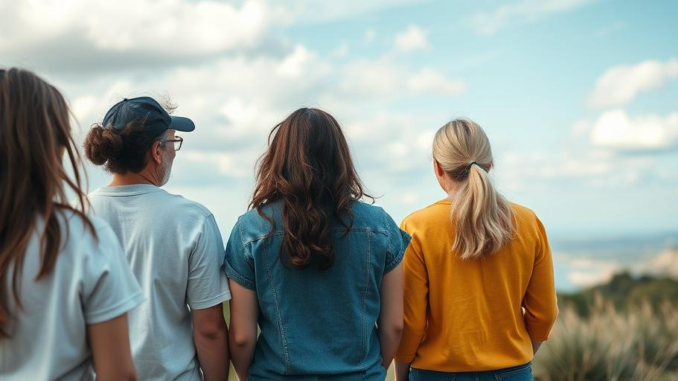
Summary
This article provides a guide to building supportive friendships after addiction. It emphasizes the importance of shared values and healthy boundaries, offering practical tips for finding and nurturing these relationships. The article explores various avenues for connecting with like-minded individuals, emphasizing the transformative power of supportive friendships in recovery.
** Main Story**
Hey everyone, let’s talk about something super important in recovery: building a solid support system. Coming out of addiction, it’s not just about quitting the substance; it’s about reshaping your whole life, and that includes who you hang out with. Honestly, forging new, healthy friendships is often the make-or-break factor for long-term sobriety. So, how do you even start?
Realize What You Bring to the Table
First off, you gotta tackle that fear of rejection. Easier said than done, right? But seriously, think about your strengths. What makes you a good friend? Are you a killer listener? Do you have a knack for making people laugh, even when things are tough? Maybe you’re just incredibly reliable. Focusing on those positive traits isn’t just about boosting your ego; it’s about recognizing that you have something valuable to offer.
Find Your Tribe: Sober Environments
Now, where do you actually find these amazing, supportive people? Well, the key is to look in places where sobriety is the norm, not the exception. Here’s a few ideas:
-
Support Groups: This one’s kind of a no-brainer, but it’s worth repeating. Twelve-step programs like AA or NA are goldmines. You’re surrounded by people who get it, who understand the daily struggles and celebrate the small victories. You’ll find shared experiences, accountability partners, and tons of encouragement. I’ve been to a few meetings, not for addiction, but to support a friend, and the feeling of community is palpable.
-
Community Activities: Think about things you enjoy doing that don’t involve alcohol or drugs. Maybe it’s a fitness class, a volunteering gig, a book club, or even a local sports team. Shared interests are an awesome way to connect with people on a deeper level. Plus, you’re doing something good for yourself at the same time. I started rock climbing a couple years ago, and it’s been amazing both for my fitness and for meeting new, positive people.
-
Worship Communities: If you’re a person of faith, getting involved in your local church, synagogue, or mosque can be incredibly helpful. Bible study groups, prayer circles, or just volunteering for church events can connect you with like-minded individuals who share your values. I know someone who found a great mentor and friend through their church’s outreach program.
Don’t Be Afraid to Put Yourself Out There
Look, stepping outside your comfort zone is never easy, but it’s essential. Say ‘yes’ to social invitations, as long as they don’t jeopardize your sobriety, of course. Try new activities, even if they seem a little intimidating. Be approachable, smile, introduce yourself, and actually listen when people talk. You never know where you might find your next best friend. I remember being terrified to go to a pottery class alone, but I ended up meeting someone who became a close confidante.
Building Strong Bonds: Nurturing New Friendships
Okay, so you’ve met some potentially awesome people. Now what? Building strong friendships takes time and effort, just like anything else worth having. Here are a few tips:
-
Active Listening: Seriously, put your phone down and pay attention. Ask questions, show genuine interest, and offer support without judgment. People can tell when you’re really listening, and it makes a huge difference.
-
Shared Activities: Do fun stuff together that doesn’t involve getting wasted. Hiking, movies, concerts, museums, board game nights—the possibilities are endless!
-
Open Communication: Be honest about your struggles and your successes. Share your experiences in recovery. It creates a bond of trust and mutual respect. After all, vulnerability is key to deep connection, don’t you think?
-
Healthy Boundaries: This is a big one, maybe the biggest. You have to protect your sobriety. That means setting clear boundaries, avoiding triggering situations, and communicating your needs assertively. It’s okay to say ‘no’ if something doesn’t feel right. Remember, your well-being comes first. I had to distance myself from a friend once because their drinking habits were becoming a problem for my own mental health. It was tough, but it was the right thing to do.
Quality Over Quantity, Always
Don’t try to be friends with everyone. Focus on building a few close, supportive relationships rather than a huge, superficial network. Deep, meaningful connections will offer way more support and stability in the long run. Be patient, allow friendships to develop naturally, and invest your time and energy in those who genuinely care about you.
What About Old Friends?
This is a tough one. Navigating relationships with friends who still use substances can be incredibly challenging. You’ve got to be upfront about your commitment to sobriety and set firm boundaries. If those friendships are putting your recovery at risk, then, as hard as it is, creating some distance might be necessary. Your sobriety has to be your top priority, period. There’s really no way around that, is there?
Ultimately, building supportive friendships after addiction isn’t just a nice-to-have; it’s a need-to-have. These connections are a source of strength, encouragement, and accountability, and they’ll help you stay on track and build a fulfilling, substance-free life. So, go out there, be yourself, and find your tribe. It might take time, but it’s totally worth it.
Now, as of today, March 23, 2025, this information is pretty solid, but remember, resources and programs can change, so always double-check. And most importantly, be patient with yourself; building meaningful relationships takes time and effort, but trust me, the rewards are huge.


Be the first to comment